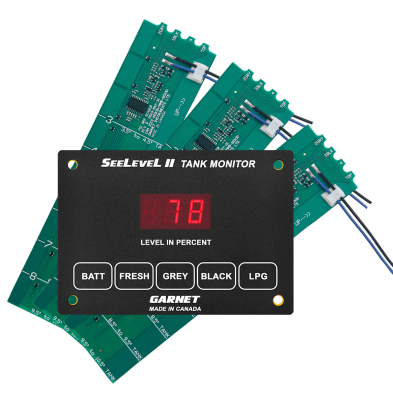When you’re out on the road, the best RV water filter system is the one you can count on, no matter where you hook up. For many RVers, a multi-stage canister system strikes the perfect balance between serious filtration power and convenience. But even a simple inline filter is a massive upgrade over nothing and works great for casual campers.
The goal is to find a system that acts as a reliable gatekeeper for your entire rig’s water supply, protecting both your health and your plumbing.
Why a Quality Water Filter Is an RV Essential

Picture this: you’ve just pulled into a beautiful new campground, ready to kick back and relax. You connect your water hose, but what’s really coming through that line? Every time you hook up to a new spigot, you’re rolling the dice on water quality. It might be crystal clear city water, or it could be hard well water full of sediment, heavy chlorine, or other contaminants.
This isn’t just about your morning coffee tasting a little “off.” Those impurities can impact your health and do a real number on your RV’s plumbing. A good water filter isn’t just a nice-to-have accessory; it’s a non-negotiable piece of gear that stands between you and whatever comes out of the campground tap.
Your RV’s First Line of Defense
Think of a quality filter as a dedicated security guard for your RV. It’s your first line of defense, catching all the unwanted sediment, chemicals, and contaminants before they get into your pipes, holding tanks, and appliances. Without that protection, sediment can easily clog up faucet aerators and your showerhead, slowing your water pressure to a frustrating trickle.
Even worse, hard water minerals can build up as scale inside your water heater, making it less efficient and setting you up for expensive repairs down the road. The right filter stops these problems before they start, protecting your investment and keeping everything running smoothly. It’s just smart, proactive RV maintenance.
A quality RV water filter does more than just improve taste—it protects your plumbing, appliances, and peace of mind, transforming unpredictable campground water into a reliable resource you can trust.
It’s clear people are catching on. The global demand for water purification systems, including those for RVs, is climbing as folks become more concerned about water quality. The market was valued at USD 59.18 billion in 2025 and is expected to shoot past USD 123.24 billion by 2037, all driven by a shared desire for cleaner, safer water. You can explore more about these water quality trends to see the bigger picture.
Beyond the Tap
The perks of filtered water go way beyond just the kitchen sink. When you install the best RV water filter system for your setup, you’ll immediately notice the difference everywhere:
- Better Showers: No more showering in water that smells like a swimming pool. Filtered water can also feel softer on your skin and hair.
- Healthier Living: You can feel confident that the water you use for cooking, brushing your teeth, and washing produce is clean.
- Appliance Protection: Your ice maker, water heater, and even your washing machine will last longer without mineral and sediment buildup causing premature failure.
At the end of the day, investing in a solid filtration system is about buying peace of mind. It lets you fully embrace the freedom of the road without ever having to worry about what’s coming out of your faucet.
Understanding Different RV Water Filter Technologies
Choosing an RV water filter can feel overwhelming, with terms like “micron ratings” and “activated carbon” getting tossed around. But the basic concepts are actually straightforward. At the end of the day, each type of filter is just a different tool designed to solve a specific water problem you might encounter on your travels.
Think of it this way: you wouldn’t use a sledgehammer to hang a picture. In the same way, the simple inline filter that’s perfect for a weekend trip isn’t the right tool for a full-timer who’s pulling water from all kinds of questionable sources. Understanding the tech helps you pick the right tool for the job.
The Foundation: Sediment and Carbon Filters
Most RV water filtration systems are built around two core technologies: sediment and carbon filters. These are the workhorses, forming the backbone of everything from the simplest hose-end models to complex, multi-stage setups. They work together to knock out the most common water problems.
- Sediment Filters: This is a mechanical filter that acts as a physical barrier for your RV’s plumbing. Its only job is to stop the big stuff—sand, silt, rust, and dirt—before it can get inside and cause trouble. This is your non-negotiable first line of defense, keeping your faucets from clogging and protecting the more delicate filters down the line. Start here: 5-micron sediment filters.
- Activated Carbon Filters: This is where the real magic happens for taste and smell. Activated carbon adsorbs chlorine and VOCs that make water taste/smell off. See: 0.5-micron carbon block filters.
Often, these two are combined into a single filter cartridge, giving you a one-two punch that makes a huge difference in the quality of most campground water. It’s no surprise that the demand for clean water is booming. The water filters market, which includes RV systems, was valued at USD 15.8 billion in 2025 and is projected to hit USD 21.86 billion by 2029, driven by our desire for safer, healthier water. You can read the full research on water filter market trends if you want to dive deeper into the numbers.
Stepping Up Your Game: Advanced Canister Systems
For RVers who want better performance and the ability to customize their setup, canister systems are the logical next step. Instead of a single, disposable filter, these systems use heavy-duty housings that hold replaceable filter cartridges. Build your kit: dual/triple canister systems • 10″ housings • mounting brackets.
Multi-stage canister systems let you adapt to whatever the local water throws at you—swap cartridges to target sediment, chlorine, or specific contaminants.
Before we get into the heavy-hitters like Reverse Osmosis and UV, let’s break down the common technologies in a simple table. This will help you see at a glance what each type of filter does best and who it’s really for.
Comparing Common RV Water Filter Technologies
| Filter Technology | Primary Function | Best For Removing | Ideal RVer |
|---|---|---|---|
| Sediment Filter | Mechanical Straining | Sand, silt, rust, dirt | Everyone — essential first stage |
| Activated Carbon | Adsorption | Chlorine, VOCs, taste/odor | Everyone — taste/odor improvement |
| Reverse Osmosis (RO) | Membrane Separation | Salts/minerals, heavy metals | Full-timer/boondocker — bottled-water quality. RO systems |
| UV Purifier | Microbe Inactivation | Bacteria, viruses, protozoa | Off-grid sources. UV purifiers |
Specialized Solutions for Ultimate Purity
- Reverse Osmosis (RO): Exceptional purity for drinking water; note storage/brine needs. See RV-friendly RO options.
- UV Purifiers: Final-stage biological safety when sources are unknown. See RV UV kits.
Essential Features of a Great RV Water Filter

Micron rating: For most RVers, the “gold standard” path is 5-micron sediment → 0.5-micron carbon block.
Flow rate & pressure: Quality RV filters target ~2.0–2.5 GPM. If flow suddenly drops, it’s time for replacement cartridges.
Materials & durability: Favor BPA-free housings, brass fittings, and good hardware. Build it right with lead-free drinking hoses and a 90° hose elbow.
How to Choose the Right System for Your Travel Style
For the Weekend Warrior
- Primary Need: Taste/odor improvement
- Pick: High-quality inline filter
For the Full-Time Family
- Primary Need: Consistent safety & performance
- Pick: Multi-stage canister system + 0.5-micron carbon block
For the Boondocking Explorer
- Primary Need: Microbiological safety
- Pick: Canister system + UV purifier (or absolute ≤1-micron filter)
Matching Your Filter System to Your RV Lifestyle
| RVer Profile | Primary Need | Recommended System Type | Key Features to Prioritize |
|---|---|---|---|
| The Weekend Warrior | Better taste & smell | External Inline Filter | Activated carbon, ease, value |
| The Full-Time Family | Consistent safety/performance | Multi-Stage Canister | 5-µm sediment + 0.5-µm carbon, higher flow |
| The Boondocking Explorer | Microbiological safety | Canister + Purifier | Absolute ≤1-µm, UV stage |
| The Occasional Dry Camper | Flexibility | Quality Canister | 0.5-µm carbon, good GPM, purifier add-on |
Getting Your Filter Installed and Keeping It Running Smoothly

The installation process is a simple sequence: prep, connect, and flush. Master these steps, and you’ll prevent leaks and get optimal performance from day one.
Installing Your External Filter
- Regulator First, Always: Attach a water pressure regulator to the spigot.
- Connect the Filter: Screw the inline/canister filter directly to the regulator; follow flow arrow.
- Flush It Out: Run water 30–60s to clear carbon fines.
- Connect & Check: Use a lead-free hose and inspect for leaks; add a 90° elbow at the RV inlet to reduce strain.
Keeping Your System in Top Shape
Proper maintenance unlocks the filter’s real value—better water, protected plumbing, fewer headaches.
- When to Change: Replace cartridges every 3–6 months or when flow drops.
- Sanitize Annually: During de-winterization, sanitize tanks/lines: fresh-water system sanitizer.
- Winterize: Disconnect, drain, and store filters dry; keep spare cartridges on hand.
Frequently Asked Questions About RV Water Filters
Can I Drink from My Fresh Water Tank After Filtering?
Yes—filter into the tank (inline before fill) and sanitize periodically. Consider a dedicated drinking faucet with a finer 0.5-micron drinking filter at the sink.
How Do I Know When to Replace My Filter Cartridge?
Watch flow/pressure. A sudden drop = clogged media. Swap with the correct replacement cartridge.
Will a Standard Filter Remove Viruses or Lead?
Not typically. For those, use RO, a UV purifier, or an absolute ≤1-micron element rated for cysts.
Filter vs. Purifier—What’s the Difference?
Filters remove particulates/chemicals (sediment, chlorine). Purifiers inactivate/remove pathogens (UV, RO, sub-micron). Pick based on source risk.
Ready to upgrade your RV’s water system and travel with confidence? RVupgrades.com stocks filters, canister kits, RO/UV purifiers, regulators, hoses, and cartridges. Build your perfect setup here: RV Water Filters & Systems.













